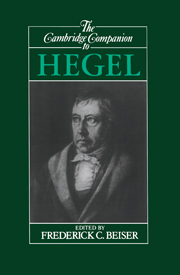Book contents
- Frontmatter
- Introduction
- 1 Hegel's intellectual development to 1807
- 2 You Can't Get There from Here
- 3 Hegel's conception of logic
- 4 Hegel's idealism
- 5 Hegel's dialectical method
- 6 Thought and being
- 7 Hegel's ethics
- 8 The basic context and structure of Hegel's Philosophy of Right
- 9 Hegel's historicism
- 10 Hegel on religion and philosophy
- 11 Hegel's aesthetics
- 12 Transformations of Hegelianism, 1805-1846
- 13 Hegel and Marxism
- 14 Hegel and analytic philosophy
- Bibliography
- Chronology
- Index
8 - The basic context and structure of Hegel's Philosophy of Right
Published online by Cambridge University Press: 28 May 2006
- Frontmatter
- Introduction
- 1 Hegel's intellectual development to 1807
- 2 You Can't Get There from Here
- 3 Hegel's conception of logic
- 4 Hegel's idealism
- 5 Hegel's dialectical method
- 6 Thought and being
- 7 Hegel's ethics
- 8 The basic context and structure of Hegel's Philosophy of Right
- 9 Hegel's historicism
- 10 Hegel on religion and philosophy
- 11 Hegel's aesthetics
- 12 Transformations of Hegelianism, 1805-1846
- 13 Hegel and Marxism
- 14 Hegel and analytic philosophy
- Bibliography
- Chronology
- Index
Summary
My aim in this essay is to sketch the political and philosophical context of Hegel's Philosophy of Right and to reconstruct the basic aim and structure of its main argument. I argue that Hegel is a reform-minded liberal who based his political philosophy on the analysis and fulfillment of individual human freedom. Hegel gave this theme a profound twist through his social conception of human individuals. He argued that individual autonomy can be achieved only within a communal context.
To understand Hegel's political views, it is helpful to see how they stand with regard to conservatism, romanticism, and liberalism. Hegel has been accused of conservatism or worse. The most common basis for this charge is Hegel's claim that what is rational is actual and what is actual is rational (Preface 24/20). This claim has been taken as a blanket endorsement of the status quo, but in the paragraph headed by this statement, Hegel distinguished between phenomena that embody a rational structure and those that do not. The mere fact that a state exists, on Hegel's view, does not entail that it is either rational or, in Hegel's technical sense, “actual. ” Hegel's distinction between existence and actuality is tied to his metaphysics, according to which the universe's rational structure progressively actualizes itself. In the political sphere, this means that social institutions aspire and tend to achieve a fundamentally rational form. The basis of this view cannot be explored here. For present purposes it suffices to note that Hegel's slogan is not a blanket endorsement of extant institutions. This does not, however, determine where Hegel's politics lie in the political spectrum. That requires determining what political institutions Hegel thought were rational and why.
- Type
- Chapter
- Information
- The Cambridge Companion to Hegel , pp. 234 - 269Publisher: Cambridge University PressPrint publication year: 1993
- 14
- Cited by

